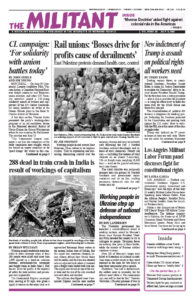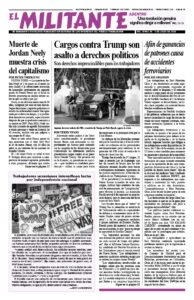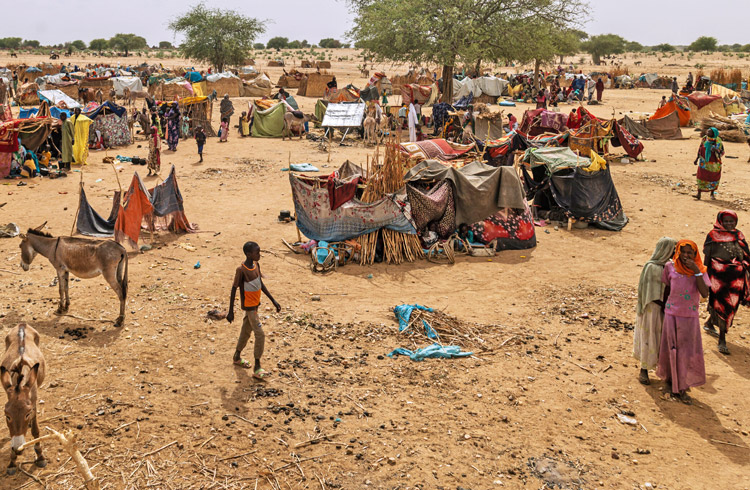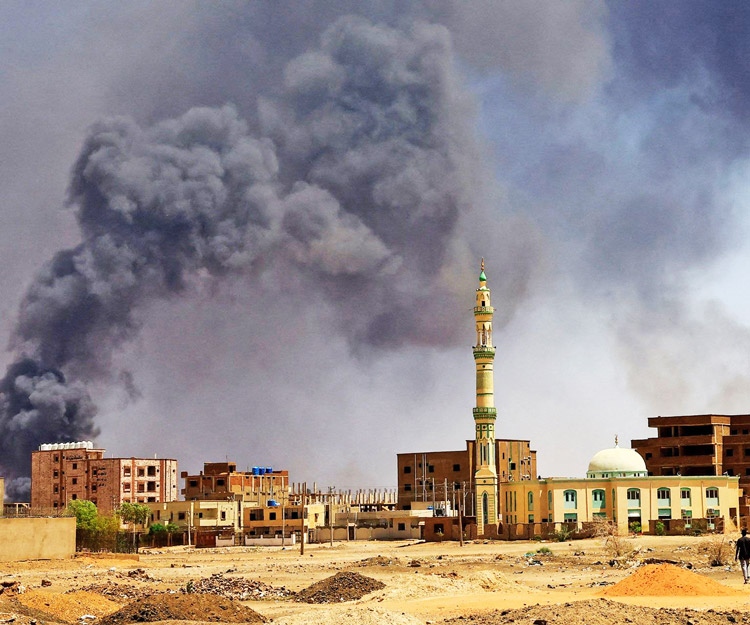Bloody clashes between the Sudan government’s armed forces and now insurgent paramilitary Rapid Support Forces exploded April 15 in Khartoum, so far killing more than 1,000 civilians and wounding over 4,000. At root is the legacy of imperialist exploitation and colonial rule and sharpened competition for profits amid today’s deepening worldwide capitalist crisis.
The fighting rapidly spread to other parts of Sudan, especially the long-conflicted Darfur region. As of June 15 at least 2.2 million people had abandoned their homes, including more than 530,000 who fled to Egypt, South Sudan, Chad, Ethiopia, the Central African Republic or Libya.
Sudan Gen. Abdel Fattah al-Burhan and the paramilitary’s Gen. Mohamed Hamdan Dagalo had joined in an uneasy alliance in 2019 to topple the three-decade dictatorship of Omar al-Bashir after months of massive anti-government protests. They promised a transition to civilian rule.
Instead, in October 2021 they carried out a coup that deposed the acting civilian prime minister, suspended the constitution and unleashed new waves of repression against workers, herders and farmers.
Burhan tried to bring the paramilitary forces under the control of the army. Dagalo resisted, seeking to increase the Rapid Support Forces’ power, including by exploring starting its own air force. Underlying all this is rivalry over who will control and profit from the country’s gold mines, livestock, oil trade, other lucrative businesses and scarce water supply.
Washington, Beijing and Riyadh, and many regimes in Africa, are pushing for a cease-fire, worried about the impact the fighting will have on their financial, economic and political interests in the region.
The regime in China is the largest lender to Sudan. The Sudanese government owes over $5 billion to Chinese entities, as well as about $2.5 billion that is supposed to be repaid with oil shipments.
History of colonial rule, revolution
Sudan has a long history of revolutionary fights against foreign domination. A victorious revolution backed by peasants, nomads, slaves and artisans against British and Egyptian intervention created an independent Sudan in 1885.
But by 1899 the British rulers — with the help of Egyptian troops as well as large landowners and slave traders inside Sudan — reconquered the country. They deepened existing tribal divisions, pitting ethnic groups against one another, as part of a “divide and rule” strategy.
Today Sudan’s population has 19 major tribal groups, 597 ethnic subgroups and more than 100 languages and dialects spoken there. Some 70% of the population are Arab Muslims, also torn by clan and class divisions.
Among the biggest divisions British imperialism fostered was between mostly Muslim Arab northern Sudan and southern Sudan, which is predominantly black African tribes with Christian or animist beliefs. After two devastating civil wars, one from 1955 to 1972 and a second from 1983 to 2005, capitalist leaders in southern Sudan won its independence in 2011 and control most of the country’s oil resources.
In power, the Bashir dictatorship created the rural Arab-based Janjaweed paramilitary — which evolved into the Rapid Support Forces — to violently suppress a rebellion by black African groups in Darfur.
Even though its officer corps was primarily drawn from al-Bashir’s Arab ethnic group, Bashir feared the army — with a large number of black soldiers, many from Darfur — would not be reliable.
The Janjaweed looted and burned black villages, slaughtering residents and stealing camels, sheep, cattle, food supplies, even suitcases and clothes. They ordered African farmers not to harvest their crops so that the animals they stole could forage.
A prominent slogan at the demonstrations in Khartoum that led to the ouster of Bashir — showing the toilers’ desire to overcome these ethnic divisions — was “We are all Darfur.”
The rivalries in Sudan are intertwined with competition and shifting alliances between various foreign powers operating there. The Moscow-based Wagner Group has been aiding and arming the Rapid Support Forces. The dictatorship in Egypt has collaborated and conducted joint war games with the government. The Saudi regime got help both from the army and the Rapid Support Forces for its war in Yemen.
Sudan — nearly three times the size of Texas, with 45 million people — is one of the poorest and least developed countries in the world.
This is despite the fact Sudan is rich in natural resources and the main source worldwide of gum arabic, a key ingredient in everything from soda to Pop-Tarts. Until recently, Sudan was among the top three nations in Africa in livestock, including camels and cattle.
The international repercussions of Moscow’s invasion of Ukraine has caused increased competition for resources and profits both between the army and Rapid Support Forces and capitalist regimes in the region.



